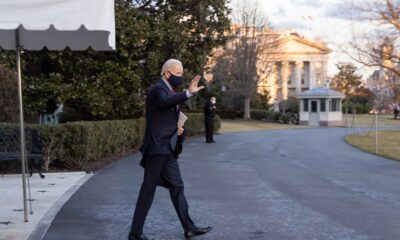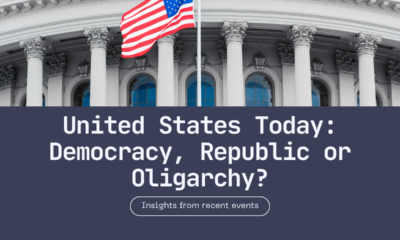Civilization
Trump off the Colorado ballot? Not so fast!
The Colorado Supreme Court disqualified President Donald J. Trump from the Presidential ballot – then stayed its own ruling.
Yesterday afternoon the Colorado Supreme Court broke the Internet with the announcement of a decision. On appeal from a lower court, the high court disqualified President Donald J. Trump from a Republican Presidential primary ballot. But they stayed their ruling until January 4, 2024 – one day before the deadline to print the ballots. Furthermore, if the U.S. Supreme Court grants review of the matter, then the stay lasts until the Supreme Court acts. This has led one influencer to suggest the Colorado Supreme Court acted to provoke unlawful behavior by conservatives. CNAV would agree and strongly urges its readers: let President Trump handle this. He has already announced his intention to petition the Supreme Court for review. Furthermore, those jurists have embarrassed not only themselves but also every RINO in all fifty States.
The Colorado ruling
Christina Laila of The Gateway Pundit provided the reportage yesterday (December 19).The Colorado Supreme Court issued a 213-page opinion. Anderson v. Griswold, case 23SA300.
Six Colorado voters, both Republican and unaffiliated, sued to keep Trump off the primary ballot. (A separate challenge seeks to keep Trump off the general election ballot in November 2024. That case will come before the Colorado Supreme Court later.) Earlier this year, Judge Sarah Wallace of the Denver District Court rejected the idea of keeping Trump off the ballot. She said the State courts lacked jurisdiction. But the State Supreme Court disagreed, apparently relying on a friend-of-the-court brief from a law professor. Gerard N. Magliocca, Amnesty and Section Three of the Fourteenth Amendment, 36 Const. Comment. 87, 91-92 (2021). Magliocca apparently rejects the notion that the Amnesty Act of 1898 applies in perpetuity. (See also here.) More than that, the Colorado court asserted that Colorado’s own legislature had created a process to determine someone’s disqualifications for “participating in insurrection or rebellion.”
Key to the court’s action is their determination that Amendment XIV Section 3 is self-executing. Merriam-Webster defines self-executing as requiring no further legislative or judicial action to take immediate force and effect. Furthermore, the court asserts, each State may make its own rules as to what constitutes insurrection, rebellion, and participation therein. Congress need not be the sole actor. This, the jurists say, flows from the directive to each State to appoint Presidential electors in such manner as the[ir] legislatures … direct.
How they arrived at Trump participating in insurrection and rebellion
Justices Richard L. Gabriel, Melissa Hart, Monica Márquez, and William W. Hood jointly signed a per curiam opinion. Which means that no one Justice actually “rode point” on this opinion. Chief Justice Brian Boatright and Justices Carlos Samour and Maria Berkenkotter dissented.
The jurists essentially rely on Trump’s posts on his X (formerly Twitter) account- to say that he called on his supporters to “fight.” When they do that, they essentially have tried Trump for making rebellion. CNAV is not aware that any State Supreme Court has original trial jurisdiction in any matter. Furthermore their evidence includes “anonymous tips” from the Federal Bureau of Investigation. Regular readers already recognize that the FBI is compromised, and has become an enforcement arm of the Democratic National Committee.
The opinion reeks with lurid accounts of how January 6 rally attendees responded to his exhortation to walk (quietly) to the Capitol. CNAV has not heard from one witness that can corroborate the Court or its sources as to someone shouting “storm the Capitol” or anything else of the kind, on the day of the rally. Ray Epps’ recorded statement that “Tomorrow … we need to go into the Capitol!” doesn’t count. Apart from his being an agent provocateur, he said that the night before, not the day of. Furthermore the opinion omits completely the recent evidence that the Capitol Police provoked the crowd deliberately. They fired rubber bullets and/or tear gas in three separate volleys before anyone made one single response in kind.
Delayed effect
In short, this Court has acted as judges, jury, prosecutors – and now executioners. According to their ruling, not only does Trump not appear on the ballot, but neither may anyone write him in. But they stayed their ruling.
But we stay our ruling until January 4, 2024 (the day before the Secretary’s deadline to certify the content of the presidential primary ballot). If review is sought in the Supreme Court before the stay expires, it shall remain in place, and the Secretary will continue to be required to include President Trump’s name on the 2024 presidential primary ballot until the receipt of any order or mandate from the Supreme Court.
President Trump has already sought review, as he explicitly said he would.
Though all seven Justices are Democrat appointees, three dissented. Chief Justice Boatright said flatly that the Election Code statute does not empower any court to determine whether a candidate “participated in insurrection or rebellion.” Similarly, Justice Samour excoriated the District Court, which evidently found positively that Trump had made insurrection. Samour said that court had no business trying such a case – and denied due process of law while so doing.
Thus, based on its interpretation of Section Three, our court sanctions these makeshift proceedings employed by the district court below—which lacked basic discovery, the ability to subpoena documents and compel witnesses, workable timeframes to adequately investigate and develop defenses, and the opportunity for a fair trial—to adjudicate a federal constitutional claim (a complicated one at that) masquerading as a run-of-the-mill state Election Code claim. And because most other states don’t have the Election Code provisions we do, they won’t be able to enforce Section Three. That, in turn, will inevitably lead to the disqualification of President Trump from the presidential primary ballot in less than all fifty states, thereby risking chaos in our country. This can’t possibly be the outcome the framers intended.
Samour also disputes the self-executing nature of Amendment XIV, given its Section 5 – the Enforcement Section. This, and Amendments XV, XVIII, XIX, XXIV, and XXVI all have nearly identical Enforcement Sections:
Congress shall have the power to enforce this Article through appropriate legislation.
To date Congress has passed no legislation to enforce Amendment XIV Section 3. That’s not even to count the two Amnesty Acts that make Section 3 moot today.
Justice Berkenkotter, reasoning similarly to Justice Samour, said the Colorado Supreme Court exceeded its Constitutional and lawful authority. Colorado’s solons, she concluded, did not authorize any court to do what the district court tried to do.
From Colorado to…
President Trump’s campaign announced their intention to petition the U.S. Supreme Court for review that evening.
Unsurprisingly, the all-Democrat-appointed Colorado Supreme Court has ruled against President Trump, supporting a Soros-funded, left-wing group’s scheme to interfere in an election on behalf of Crooked Joe Biden by removing President Trump’s name from the ballot and eliminating the rights of Colorado voters to vote for the candidate of their choice.
We have full confidence that the U.S. Supreme Court will quickly rule in our favor and finally put an end to these un-American lawsuits.
They might have reason for their confidence. Ty Cobb, a frequent Trump critic, told CNN, as quoted in The Hill, that SCOTUS might rule 9-0 for Trump. At issue: whether Trump is “an officer of the United States” within the meaning of the Constitution. Cobb cited several cases to suggest that the President is not such an officer.
The Trump campaign also said they would ask SCOTUS to stay the decision themselves. But that might be a moot point. The minute Trump’s team files a petition, the stay continues until SCOTUS denies the petition or issues a mandate.
Different States have taken different attitudes. Last month, the Minnesota Supreme Court refused to issue any such disqualification order. But this afternoon, Jim Hoft reported that Lt. Gov. Eleni Kounalakis (D-Calif.) asked California Secretary of State Shirley Weber, in writing, whether California could also keep Trump off its ballot.
In that letter, the lieutenant governor referred to a decision by then-Judge Neil Gorsuch, that States had a duty to determine ballot eligibility according to Constitutional restrictions. In Hassan v. Colorado, Gorsuch held that the:
state’s legitimate interest in protecting the integrity and practical functioning of the political process permits it to exclude from the ballot candidates who are constitutionally prohibited from assuming office.
That case involved a naturalized citizen trying to run for President. As no one would dispute, he was not a natural born citizen. However, that case turned directly on Article II Section 1 of the Constitution – which treats appointment of Presidential electors.
Other legal eagles weigh in
Prof. Orin Kerr of the law school at the University of California at Berkeley, doubted that the courts could bar Trump from running.
Late that evening (Berkeley time), Prof. Kerr scorned an article in The Washington Post talking about how “momentous” the decision was.
Trump condemned the decision in a speech to his supporters in Iowa:
Candidate Vivek Ramaswamy withdrew his name from the Colorado Primary until Trump regains his ballot access. He challenged the other candidates – Gov. Ron DeSantis (R-Fla.), former Gov. Chris Christie (R-N.J.), and former Gov. Nikki Haley (R-S.C.) to do likewise. If they do not, he suggested, they would then be accessories to an unconstitutional act.
Furthermore, the Colorado Republican Party suggested they might cancel their primary and hold caucuses instead.
But Gov. DeSantis put forward an interesting conspiracy theory. He suggested that the Democrats pulled a “stunt” to make Trump’s nomination more likely, rather than less. The Democrats would then be more likely to beat Trump than, say, DeSantis in the general election, his theory states.
The President of El Salvador became the first foreign head-of-state to heap scorn on the ruling.
A psy-op?
Influencer Viva Frei pointed to the stay of the ruling and accused the Colorado Supremes of running a psy-op. Do not, he warned his listeners, do anything “stupid” – meaning rash. Let Trump handle it.
Influencer Legal Mindset, for nearly an hour, tore the decision apart. He suggested SCOTUS should vacate the judgment and remand the case with instruction to dismiss it – for lack of standing. Presidential eligibility, he said, was a federal issue, for federal, not State, courts.
Those two influencers are correct. The Colorado Supreme Court cleverly hid the stay of their own ruling – so cleverly that at least one legacy media organ (The Washington Post) trumpeted the triumph of the left over the right. They did this without regard to the stay, or what it meant.
Furthermore, several legal experts have already said the Colorado Supreme Court made several reversible errors. Dick Morris suggested that Justice Gorsuch, as Supervising Justice of the Tenth Circuit, could dispense with the case himself. To do that he would likely issue a stay, or an injunction, on his own authority. The late Justice Sandra Day O’Connor once wrote:
Today, the Circuit Justices (that is, Supreme Court justices who are assigned to supervise a certain circuit) “no longer sit as judges on appellate panels…[instead], acting alone, [they] have the power to grant stays or injunctions in both civil and criminal cases, to arrange bail before and after conviction, and to provide other ancillary relief, such as extensions of time for various filings and other procedural variances.”
Whether Justice Gorsuch really has that power in a State case is unclear. Almost certainly the full U.S. Supreme Court will grant review and reverse the judgment. In the meantime, by reason of the stay, nothing happens. So if those four Colorado Justices – or anyone else – really were bating Trump supporters, they should not rise to it.
Terry A. Hurlbut has been a student of politics, philosophy, and science for more than 35 years. He is a graduate of Yale College and has served as a physician-level laboratory administrator in a 250-bed community hospital. He also is a serious student of the Bible, is conversant in its two primary original languages, and has followed the creation-science movement closely since 1993.
-

 Executive4 days ago
Executive4 days agoSecret Service chief gets no solace
-

 Executive3 days ago
Executive3 days agoWaste of the Day: Louisville Taxpayers Pay Nearly $600,000 For Empty Building’s Maintenance, Security
-

 Guest Columns4 days ago
Guest Columns4 days agoFear Itself: Democrats’ Favorite Strategy Caused Their Current Chaos
-

 Executive3 days ago
Executive3 days agoWhere is Joe Biden – or Jill?
-

 Executive1 day ago
Executive1 day agoWaste of the Day: Throwback Thursday: Cities Used Crime Prevention Funds on Soccer Games, Paper Shredding
-

 Executive2 days ago
Executive2 days agoFacile and politically motivated suggestions
-

 Civilization4 days ago
Civilization4 days agoBuild Iron Dome in the United States To Prepare for Israel’s Worst Day
-

 Executive4 days ago
Executive4 days agoThe Emerging GOP Plan To Beat Kamala Harris














